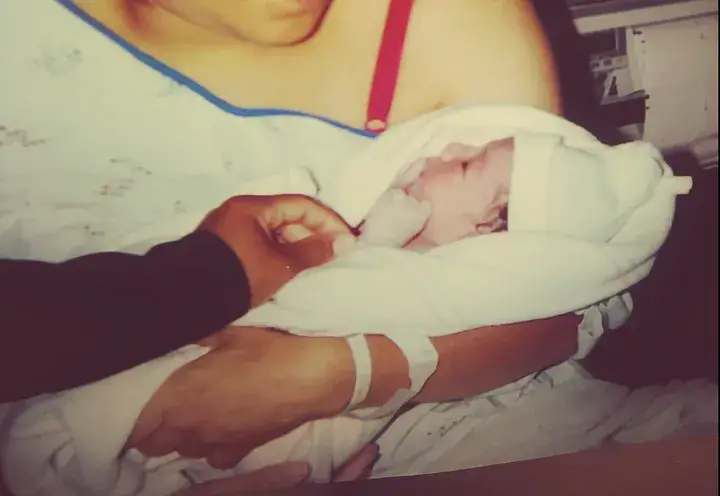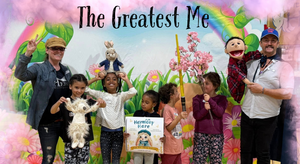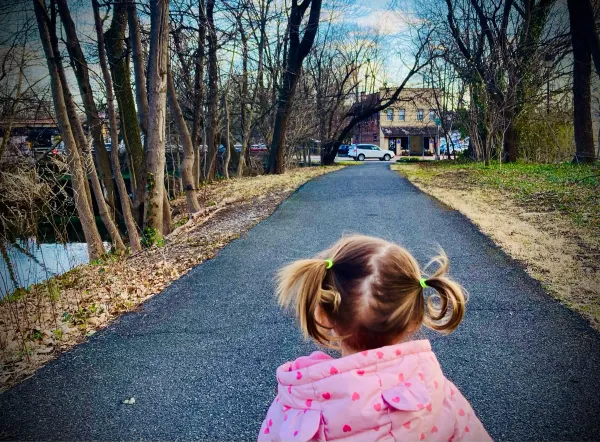This article was first featured in our free weekly Raising Empowered Kids newsletter. Sign up here to receive exclusive first looks at our best strategies, guides; and inspiring stories.
At seven years old, my grandmother told me my mother was poor. I knew she shouldn’t have said that to me, and I looked at her to see if she had an explanation, but she didn’t. I spent that night in her guest room. I began to question why everyone else had more money in the family and if it was terrible that my mom was poor. Is it her fault? I wondered as I lay on the thick, pink, and white striped comforter, looking around the decorated room. My grandmother’s house was huge; there were three bedrooms, two bathrooms, both with showers, and another room in the two-car garage big enough to be a studio apartment.
The following day, my mother picked me up. She came in the door with a huge smile and her arms wide open as she waited for me to fall in them. I quickly ran to her, happy to feel her hug me. As we walked down the light grey cement driveway to the car, I couldn’t help but think about what my grandmother said. I realized I didn’t care about how much money my mom didn’t or did have. I sat in the back of my mother’s car and watched as the cars passed us on the street. I felt my mouth and throat get dry. My hands began to sweat as I felt like two walls were caving in on me.
I only had two options, be a liar or hurt my mother’s feelings.
I looked up at the black-outlined rearview mirror. I watched my mother sing her heart out as the music played in the car. We made eye contact in the mirror, and I quickly looked away. “What’s wrong?” she asked me. “Nana said you’re poor,” I replied. I watched as her eyes became watery and her lips trembled while her voice cracked as angry words parted from her mouth. I wondered if I had done something wrong by telling her what my grandmother said. I told myself to be quieter. I never spent the night after that.
Little did I know I would witness myself lose a relationship with my grandmother and my mom lose a relationship with her mother.

I was thirteen when we began visiting more frequently. I was not too fond of Sundays. I woke up, showered, dressed, and got in the car. I sat in the back seat and put my purple headphones in as my mother drove down the highway. “You’re going to lose your hearing early if you don’t stop that,” she warned me, then smiled. I stuck them farther in my ear and turned up the volume on my phone before we laughed. The lyrics and melodies flooded my ears as I looked out the tinted window and saw the big red CVS sign. I knew we were close, so I took my headphones out and got my belongings together. We pulled into the driveway, and I watched the garage doors drag open. There, my grandmother stood, waving and smiling. I smiled back and looked at my mom as she parked the truck. I noticed my mom look so excited before we began to walk through the garage and up the steps. The smell of paint dulled by the smell of gasoline filled my nose as I walked. Before I knew it, we finished walking up the white steps and were in the kitchen. I saw my mom go for a hug. She always had the biggest smile on her face as she would squeeze tight.
Meanwhile, her mom stood there, statue-like, stiff as a tree. I noticed and put the bags on the table before sitting on the sofa. As always, I ignored the coldness I saw and went in for a hug. She hugged me back before letting me go. I hugged my mom and sat with her on the black leather sofa. I sat scrolling on my phone as I listened to them joke and discuss what was going on in their lives. Then my mom mentioned how I was growing up, and before she knew it, I would begin dating. My grandmother told me I should have two rules for dating. Make sure the person you love loves you more than you love them, and make sure they’re rich. I quickly detested the idea. However, I just nodded with a half smile before walking away. I made eye contact with my mom, and even though she was smiling, I could see how she was uncomfortable.
We ate dinner together that day, and I watched as my mom picked at her food. The sun started to set, and we decided to leave. We said our goodbyes and walked down the cement stairs. I looked around her neighborhood and noticed how big the houses were, how everyone’s yard was decorated and well-kept, and everyone had a garage. I looked at the kids riding their bikes freely, not afraid of hearing gunshots or witnessing something they shouldn’t. I felt jealous of them. Seeing the freedom their families’ money had given them stood out to me. We got in the car, and I listened to my mom whisper under her breath. I shut the door and put on the dark grey seatbelt before turning to look at her. “Money isn’t everything; make sure you love them,” she said before putting on her Fantasia CD. The car ride home felt long as we both sat there, mouths shut, windows down, and the music playing.
For the first time, I felt angry towards my mom for allowing her to say these things. I began to wonder if I should listen to my grandma.
That year I began eight-grade. I made my first social media profile. I began re-sharing posts and decorating my profile with pictures. I re-shared a status with a curse word and only thought a little of it since I wasn’t the person who typed it. That night my mom came into my room and asked me why I was cursing on social media. Confused, I furrowed my brows, and then she told me what the status said. I quickly remembered it was the one I shared. “I didn’t write that status; I just shared it. I’m sorry”, I said as I deleted the status. I asked her who told her about it, and she told me my aunt had. “What if your grandma would’ve seen it?” she asked before shutting my cream-colored bedroom door. That incident was one of the many instances where I was reminded to think about what my grandma would say.
Later that night, I went to my mother’s door. I heard her yelling and realized she was on the phone. I knocked on my mother’s wooden door. “Come in,” she said in an irritated tone. I noticed she had just hung up the phone. I asked her if everything was okay. “Yes, I just got off the phone with your nana,” she said. “Well, what did she say?” I asked before sitting on the edge of her bed. “She told me I’m jealous of her and your aunt because they have money,” she said quietly but frustratedly. After this, I tried to ensure I was perfect, so there was nothing my grandma could say about me when talking about my mom. This chase led to anxiety and wondering if everything I did was good enough. As I excelled in academics, I fought a silent battle. I thought everything would be okay as long as my mom could tell them about my awards, scholarships, and grades.
Before I knew it, it was the end of my eighth-grade year. I knew high school was coming, and I wanted to make sure I had a job to purchase a new wardrobe and the latest shoes. However, my mother told me that she didn’t want me to have a job. She wanted me to focus on school before I worried about working. She wanted me to have fun. I sat there, annoyed. How was I going to be happy without money? How would I look like I had more money without having a job? My grandma’s reminders played in my head. That’s when my mother told me the truth.
My grandma didn’t raise her. When she was a one-year-old, my grandma dropped her off to two women in St. Joe, Missouri. She spent eight years there with her siblings learning and receiving love from the two women she called her grandmas. She told me those were the best times of her life. She smiled as she talked about St. Joe. I noticed how different her demeanor was when she spoke of her grandmas’. She told me her senior year, she only went to school for half the day and then went to work after her last class. She would get her bi-weekly checks and tips and have to give them all to my grandma. She hid some of her tips in her bra and socks so she would have some money. I looked straight ahead at the beige wall as she continued. She had her favorite sibling, Poncho: her brother, my uncle, who passed away. She told me that ever since then, she’s felt so alone. I sat in disbelief, speechless, as she finished her sentence. I stared at the wall before turning around with a tear in my eye. We cried as I tried to comfort her.
Still, we continued Sunday’s routine for five more years — each visit ending with silent car rides, sadness, and hidden anger. I witnessed the frustration and tension build up as time went on. Each visit led to an argument or subliminal messages, and I sat there quietly, watching my mom as she watered herself down to an unrecognizable version. I grew resentful towards my mom for letting herself be hurt repeatedly and expecting me not to be angry.
I counted down the Sundays left until I left for college. Three more Sundays, and it’s over, I kept telling myself. I thought I escaped when I went off to college. I wouldn’t have to see my mother suffer anymore or interact with someone I didn’t want to interact with. I was wrong.
I boarded the plane, excited to see my mother for the first time in two years. I fell asleep as the hum of the wings cutting through the clouds filled my ears. I felt a tap on my shoulder which woke me up. I looked around and noticed everyone was exiting the plane. We arrived at the airport. I grabbed my suitcase and ran to find my mother. She stood beside the exit sign with open arms, waiting for me to fall into them again. We laughed as we walked to the white SUV. I threw my suitcase in the back and climbed up front. She began driving, and I got so caught up talking to her that I didn’t realize where we were going. We ended up at the big house with a perfect two-car garage. But I knew the truth. It was far from perfect.
I saw my grandmother standing in the driveway. This time the garage wasn’t open; my mom told me we were only saying hi. I noticed my mom fix her hair twice in the mirror before we exited the car. I felt my hands shake and my ears get hot as I watched her try to be perfect. I realized I had watched her get mistreated over and over. Then my grandmother began asking me questions. I knew I had to be calculated with my answers because if I weren’t, my words would be misconstrued, and it would spread through the family like wildfire.
After ten short minutes, we left. I decided this car ride wouldn’t be silent. I asked my mom if she was okay before she turned her music on. “No, but I will be,” she said. She seemed less defeated than usual. “I’m over it, Jai,” she told me after we arrived home. She picked up her black phone and called my grandmother. She sounded confident and angry, stating that she felt alone and everything she and her kids do is wrong. I was proud of her. Then I heard laughter. My grandmother laughed, and my mom’s expression changed from frustration to sadness. She hung up the phone and sobbed.
My anger began fading as I realized days I thought she was angry with me; she was sore from a phone call that turned sour. The resentment left as I realized she was a hurt little girl who wanted her mom. I held her that day, and we bonded in a way no one could ever understand.
We never saw or talked to my grandmother again, and I haven’t seen an angry or hurt mother anymore.
This article was originally published at Medium. Republished with permission from the author.











Member discussion